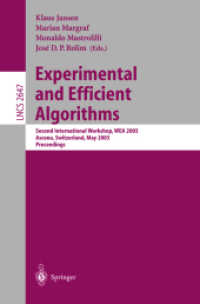- ホーム
- > 洋書
- > ドイツ書
- > Humanities, Arts & Music
- > Religion & Theology
- > christianity
Full Description
Gregory of Nazianzus (329-390 AD), one of the most important and influential church writers from late antiquity, distinguishes in his work between the absolutely incomprehensible nature of God and the work of God that people can experience. Nadja Heimlicher shows how the theologian makes this distinction and what he gains from it for his talk about God. Heimlicher presents a consistent representation of the interplay of theoretical foundations and their practical development in Gregory of Nazianzus. While his interest in theological work is on the question of knowing God, in the context of lived faith it shifts to striving to experience God and ultimately to union with God. It is one of Gregory's core concerns that the practice of faith always precedes theology and forms the basis for it as a nurturing basis.








